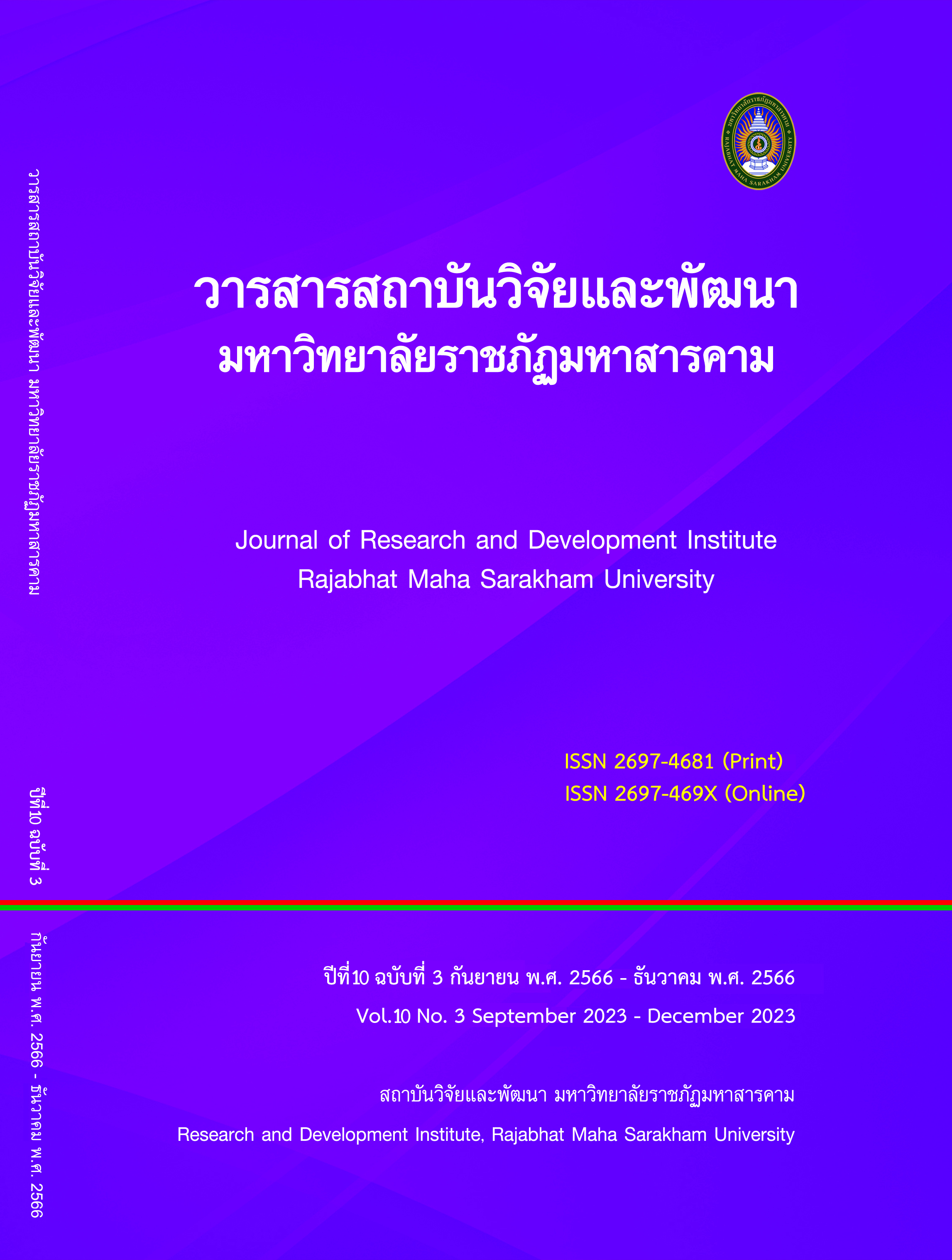The development of activities using Problem-Based Learning (PBL) in the production of goods services and consumer protection of Mathayomsuksa 2 Students
Keywords:
Problem-solving abilities, problem-based learning activitiesAbstract
The aims of this study were to (1) develop problem-based learning activities on the production of goods, services and consumer protection of Mathayomsuksa 2 students to be effective according to the 80/80 criterion, (2) compare the learning achievements between learning by the problem-based learning activities and learning by normal methods, (3) compare the problem-solving abilities between learning by the problem-based learning activities and learning by normal method, and (4) study the students' satisfaction toward the problem-based learning activities. The sample group consisted of Mathayomsuksa 2 students, Rong Kham School. The research instruments are as follows: 1) 10 problem-based learning activities plans, 2) A 30-item multiple-choice learning 3) The questionnaire measures problem-solving ability towards the problem-based learning management and 4) A 15-item questionnaire on student satisfaction with problem-based learning management. The data were analyzed by mean, standard deviation, and independent t-test.
The results were as follows; (1) The efficiency of problem-based learning activities was 81.27/82.66. (2) The learning achievement of learning activities was higher than the normal method at statistical significance at the .05 level. (3) The problem-solving ability after learning of Mathayomsuksa 2 students who learned by problem-based learning activities was higher than normal method at statistical significance at the .05 level, and (4) The student's satisfaction towards the problem-based learning activities was at a high level.
References
Barell, J. (1998). PBL an Inquiry Approach. Illinois: SkylightTraining and Publishing.
Borrows, H. S. (1996). Problem-Based Learning in Medicine and Beyod: A Brief Overview, In L. Wilkerson and W.H. Gijselaers (eds.), New Directions for Teaching and Learning Series, No. 68 (pp. 3-11). San Francisco: Jossey-Bass.
Hmelo, C.E. and Evensen, D.H. (2000). Introduction Problem –Based Learning: GainingInsights on Learning Interactions Through Multiple Methods of Inquiry. In D.H.Evensen and C.E. Hmelo (eds.), Problem –Based Learning A Research Perspectiveon Learning Interactions, pp. 1-16. Mahwah, New Jersey: Lawrence ErlbaumAssociates
Iffat Kader. (2016). Results of open learning methods. together with the SSCS model on science learning achievement problem solving ability and satisfaction with learning management of Mathayom 4 students (Master's degree thesis). Pattani Prince of Songkla University.
Thawornwong, N. (2008). Evaluation of problem-based teaching (PBL) of preclinical subjects in the Doctor of Medicine curriculum. Faculty of Medicine, Srinakharinwirot University. (Master's Thesis), Bangkok: Srinakharinwirot University.
Wongwichitanon, P. (2014). A study of problem-solving skills and academic achievement of Mathayom 5 students By teaching using a problem-based model combined with media. Multimedia Course S 32201 Buddhism: Principles of group Buddhism. Learning content of social studies, religion and culture (Master's thesis). Khon Kaen: Khon Kaen University.
Savery, J. R. (2006). Overview of Problem-based Learning: Definitions and Distinctions. Interdisciplinary Journal of Problem-Based Learning, 1(1), 9-20.
Chanla, S. (2017). Development of problem-based economics learning management to promote problem-solving ability and academic achievement of Mathayom 1 students (Master's thesis). Maha Sarakham: Maha Sarakham University.
Kimteng, W. (2010). Results of learning activities. Using the problem as a basis (Problem-based learning) that has an effect on problem-solving skills. Mathematical connection skills and curiosity Study aspirations of Mathayom 3 students. Master of Education Thesis. Academic field: Secondary education. Graduate school. Srinakharinwirot University.
Downloads
Published
How to Cite
Issue
Section
License
Copyright (c) 2023 สุทธิดา ประเสริฐพงษ์, ทัชชวัฒน์ เหล่าสุวรรณ

This work is licensed under a Creative Commons Attribution-NonCommercial-NoDerivatives 4.0 International License.
Articles that are published are copyrighted by the authors of the articles







